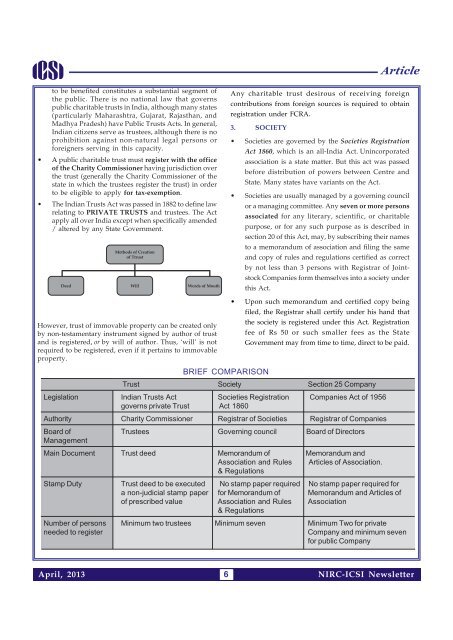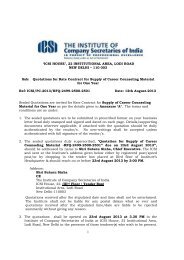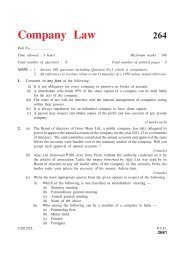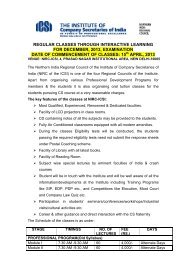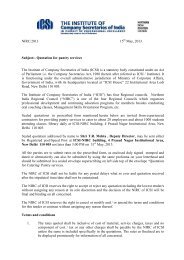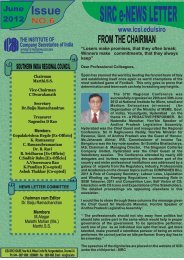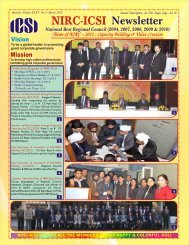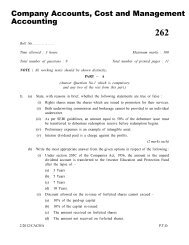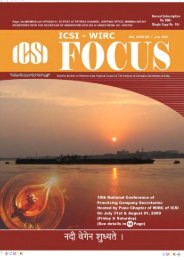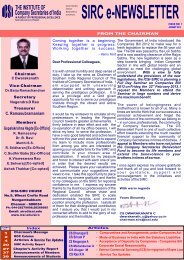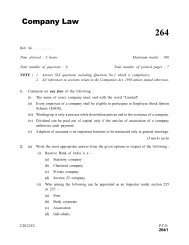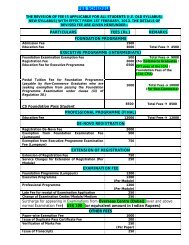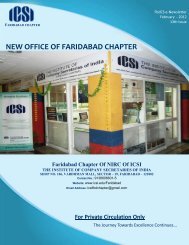April 2013 - Icsi
April 2013 - Icsi
April 2013 - Icsi
Create successful ePaper yourself
Turn your PDF publications into a flip-book with our unique Google optimized e-Paper software.
Article<br />
to be benefited constitutes a substantial segment of<br />
the public. There is no national law that governs<br />
public charitable trusts in India, although many states<br />
(particularly Maharashtra, Gujarat, Rajasthan, and<br />
Madhya Pradesh) have Public Trusts Acts. In general,<br />
Indian citizens serve as trustees, although there is no<br />
prohibition against non-natural legal persons or<br />
foreigners serving in this capacity.<br />
• A public charitable trust must register with the office<br />
of the Charity Commissioner having jurisdiction over<br />
the trust (generally the Charity Commissioner of the<br />
state in which the trustees register the trust) in order<br />
to be eligible to apply for tax-exemption.<br />
• The Indian Trusts Act was passed in 1882 to define law<br />
relating to PRIVATE TRUSTS and trustees. The Act<br />
apply all over India except when specifically amended<br />
/ altered by any State Government.<br />
Deed Will Words of Mouth<br />
Any charitable trust desirous of receiving foreign<br />
contributions from foreign sources is required to obtain<br />
registration under FCRA.<br />
3. SOCIETY<br />
• Societies are governed by the Societies Registration<br />
Act 1860, which is an all-India Act. Unincorporated<br />
association is a state matter. But this act was passed<br />
before distribution of powers between Centre and<br />
State. Many states have variants on the Act.<br />
• Societies are usually managed by a governing council<br />
or a managing committee. Any seven or more persons<br />
associated for any literary, scientific, or charitable<br />
purpose, or for any such purpose as is described in<br />
section 20 of this Act, may, by subscribing their names<br />
to a memorandum of association and filing the same<br />
and copy of rules and regulations certified as correct<br />
by not less than 3 persons with Registrar of Jointstock<br />
Companies form themselves into a society under<br />
this Act.<br />
However, trust of immovable property can be created only<br />
by non-testamentary instrument signed by author of trust<br />
and is registered, or by will of author. Thus, ‘will’ is not<br />
required to be registered, even if it pertains to immovable<br />
property.<br />
• Upon such memorandum and certified copy being<br />
filed, the Registrar shall certify under his hand that<br />
the society is registered under this Act. Registration<br />
fee of Rs 50 or such smaller fees as the State<br />
Government may from time to time, direct to be paid.<br />
BRIEF COMPARISON<br />
Trust Society Section 25 Company<br />
Legislation Indian Trusts Act Societies Registration Companies Act of 1956<br />
governs private Trust Act 1860<br />
Authority Charity Commissioner Registrar of Societies Registrar of Companies<br />
Board of Trustees Governing council Board of Directors<br />
Management<br />
Main Document Trust deed Memorandum of Memorandum and<br />
Association and Rules Articles of Association.<br />
& Regulations<br />
Stamp Duty Trust deed to be executed No stamp paper required No stamp paper required for<br />
a non-judicial stamp paper for Memorandum of Memorandum and Articles of<br />
of prescribed value Association and Rules Association<br />
& Regulations<br />
Number of persons Minimum two trustees Minimum seven Minimum Two for private<br />
needed to register<br />
Company and minimum seven<br />
for public Company<br />
<strong>April</strong>, <strong>2013</strong> 6 NIRC-ICSI Newsletter


